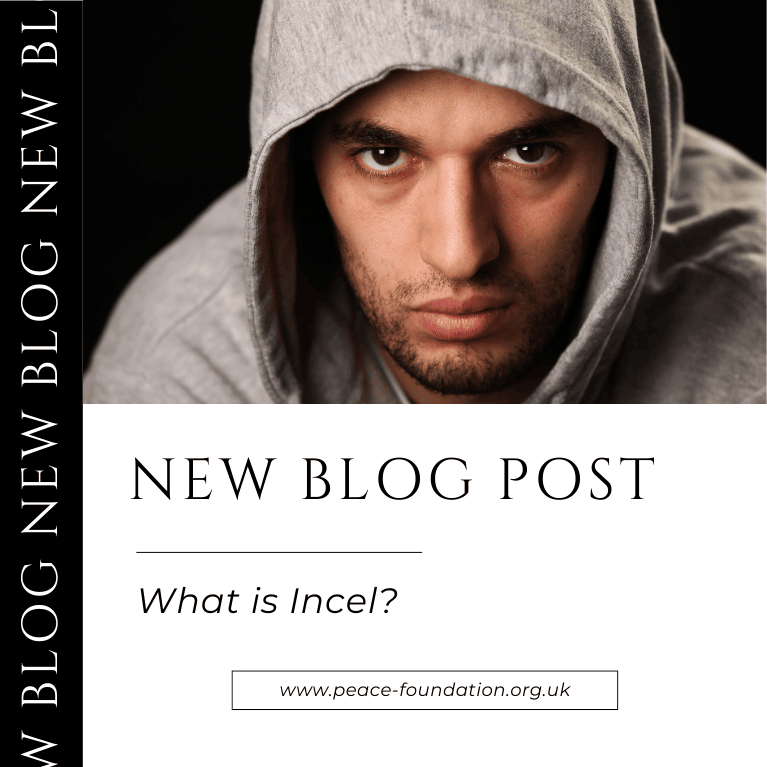
Addressing the Incel Phenomenon: Understanding the Threat
The term “incel”[1] has gained attention recently, referring to a group of predominantly young men who consider themselves unable to attract women. While not all incels engage in physically violent behaviour, there is a subset within the community that promotes misogynistic and hostile views. It is important to acknowledge the dangers of such an ideology, particularly when it may lead to violence against women and girls. We must take the threat seriously and explore how organisations like the Peace Foundation can help challenge and understand this phenomenon.
The incel movement originated from online platforms that offered support for individuals who felt lonely and excluded in society. Over time, certain incel communities have veered towards nurturing self-pity, grievances, and misogynistic attitudes. Within these communities, a minority may even endorse violence against women and men they see as attractive and successful.
At times, far-right ideologies and conspiracy theories intertwine with incel culture. This convergence can lead to the amplification and reinforcement of extremist beliefs and narratives. The narratives put forth by extremist ideologies and conspiracy theories often provide a simplistic explanation for complex social dynamics, attributing blame to specific groups or individuals. This worldview can reinforce the grievances and frustrations felt by some, further fueling their sense of isolation and resentment.
Moreover, the online nature of incel communities facilitates the spread and reinforcement of these ideologies. Online platforms provide an echo chamber where like-minded individuals can validate and amplify each other’s beliefs, creating a fertile ground for the dissemination of far-right and conspiracy-driven content. This digital environment, combined with the social isolation experienced by many incels, intensifies the potential for radicalisation and the adoption of violent ideologies.
The tragic case of Jake Davison highlights the dangerous transformation that can occur when the core incel themes of self-loathing and grievance manifest as violence. Through his postings on YouTube videos, Davison revealed his affiliation with online ‘incel’ forums, where he immersed himself in a toxic online community that nurtured his hostile views towards women and society. Regrettably, this deep-seated anger culminated in a devastating act of violence, as Davison took the lives of five individuals before ending his own. This heartbreaking incident serves as a stark reminder of the need to address the underlying issues within the incel movement and the potential consequences of allowing such harmful ideologies to persist unchecked.
Controversial social media figure Andrew Tate, known for his alarming promotion of aggression towards women, has recently been arrested in Romania on charges of rape, human trafficking, and forming an organised crime group for sexual exploitation. Tate’s online presence, use of incel language and references, and the admiration he receives serve as a reminder of the influence that individuals can have in perpetuating misogyny and hostility towards women. It is crucial to address and challenge these harmful narratives to create a safer and more inclusive society for all.
While it is essential not to generalise based on the violent actions of a few, the online presence and influence of incel ideology and narratives should not be underestimated. The increased isolation and extensive online engagement, exacerbated by the COVID-19 pandemic, have contributed to the growth and impact of incel communities. We must recognise and address the potential radicalisation and violence that can arise from this community.
In challenging the incel movement, collaboration among communities, law enforcement agencies, and educational institutions is crucial.
The Peace Foundation’s approach:
Non-Formal Peace Education:
The Peace Foundation focuses on non-formal peace education, equipping individuals with critical thinking, emotional awareness, and conflict management skills. In our peace education programmes, we equip individuals with the necessary skills to think critically, question prevailing narratives, and analyse information from multiple perspectives. We promote media literacy, empowering individuals to navigate the complex landscape and discern between reliable sources and misinformation.
Community Cohesion:
Building bridges and facilitating dialogue within communities is vital in countering the divisive nature of the incel movement. The Peace Foundation fosters understanding, connection, and social bonds, challenging the isolation and alienation experienced, promoting inclusivity, and creating alternative support networks.
We also place a strong emphasis on empathy, cultivating a culture of compassion and respect for others’ experiences, fostering connections, and breaking down barriers of isolation.
Promoting Positive Development:
In our work, we look to explore and understand the underlying factors contributing to social exclusion, such as inequality, limited education, and employment opportunities. We advocate for conditions that foster inclusivity and equal opportunities for all in our schools, youth groups, workplaces, and communities. By addressing the frustrations and social isolation underlying the incel narrative, this approach promotes empathy, respect for others, and healthy communication, challenging the distorted beliefs and negative attitudes propagated within the incel community.
Through these efforts, the Peace Foundation actively promotes a society where individuals are equipped with the tools to engage thoughtfully, critically, and empathetically in discussions surrounding sensitive topics, contributing to a more inclusive and peaceful world. By promoting critical thinking, media literacy, and inclusive dialogue, we can work towards dismantling these harmful narratives and fostering a more informed and empathetic understanding of the complex societal issues at play. Collaborating with various stakeholders, the Peace Foundation plays a vital role in preventing, resolving, and responding to incidents of violence.
Together, we can challenge the threat, ensure safety, and foster a society that values the rights and dignity of every individual.
To learn more about the Peace Foundation and how you can get involved, please visit our website at www.peace-foundation.org.uk or contact us at info@peace-foundation.org.uk or call 01925 581231.
[1] The term “incel” is derived from the phrase “involuntary celibate”.

